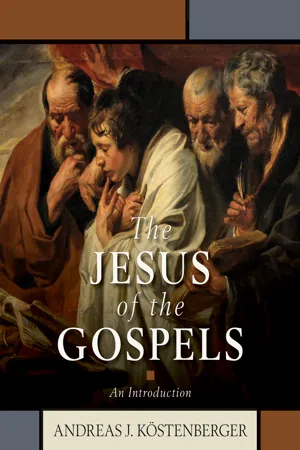![]()
CHAPTER 1
Situating This Book in the History of
JESUS RESEARCH
“The very best ‘Life of Christ’ is the four gospels. We read them with delight.”
—Charles Haddon Spurgeon
WHO DO PEOPLE SAY THAT I AM?
The life of Jesus is not primarily a life to be contemplated or even admired; it’s a call to response and action.1 As mentioned, Oxford don C. S. Lewis memorably argued that Jesus is either a liar, a lunatic, or Lord.2 If he’s a liar or lunatic—or, as a skeptic by the name of Bart Ehrman recently suggested, a legend—then of course we can readily dismiss him as a fraud or hold him at arm’s length as a fable. Yet I ask you: Is this really the most credible conclusion to draw from reading the primary sources we have about Jesus, the four New Testament Gospels? In order to find out, we need to read the Gospels and do so with an open mind and with a sound strategy. But as we’ll see, in the history of Gospels and Jesus scholarship, that’s something many unfortunately haven’t done.
What’s more, if Jesus is in fact Lord and has supreme authority over the universe and all of humanity, this means that you and I shouldn’t approach him merely with interested curiosity but with a readiness to obey and an eagerness to follow him. As Jesus told his followers, “If anyone would come after me, let him deny himself and take up his cross daily and follow me.”3 At a critical juncture in his messianic mission here on earth, Jesus took his closest followers aside and asked them, “Who do people say that I am?” When his disciples reported to him a variety of responses, he followed up with an even more pointed, deeply personal question: “But who do you say that I am?”
So, who do you say Jesus is? Before I became a Christian, I spent much of my time trying to solve the world’s (i.e., everybody else’s!) problems, quick to diagnose what was wrong with those around me while being slow to take the log out of my own eye. But when I encountered Jesus, I came to realize that he called me to decide: Who did I think he was? How would I respond to the one who died for me on the cross to offer me forgiveness and salvation out of sheer love and grace? By his mercy, I realized that I desperately needed what he had to offer and chose to follow him. But, of course, I was not the first to encounter Jesus (and many of you have had similar journeys of faith). For now, I hope you’ll join me on a brief tour of the history of Jesus research. Who did scholars over the past few centuries say Jesus was? And what can we learn from their quest for the historical Jesus as we read the Gospels today?
LIVES OF JESUS AND GOSPEL HARMONIES
The centuries following the Enlightenment period, which witnessed the rise of human confidence in autonomous critical reason, saw an increasing proliferation of so-called “lives of Jesus.” These were accounts of the life of Jesus that often owed considerably more to the imagination and philosophical outlook of the person writing the account than to the actual life of Jesus, the first-century Palestinian Jew portrayed in the canonical Gospels. Albert Schweitzer, the German biblical scholar and later medical doctor, humanitarian, and Nobel Peace Prize–winner, masterfully chronicled this phenomenon in his work The Quest of the Historical Jesus.4 In fact, Schweitzer believed that “the greatest achievement of German theology is the critical investigation of the life of Jesus.”5
As Schweitzer noted, “We are dealing here with the most vital thing in the world’s history. There came a Man to rule over the world; He ruled it for good and for ill, as history testifies…. He continues, notwithstanding, to reign as the alone Great and alone True.”6 Schweitzer shows how the practitioners of the quest for the historical Jesus sought to rediscover the “Jesus of history” by peeling off layers of theological tradition, enlisting the historical Jesus “as an ally in the struggle against the tyranny of dogma.” In that noble pursuit, however, Schweitzer discovered, “each individual created Him in accordance with his own character.” In fact, “there is no historical task,” Schweitzer continued, that “so reveals a man’s true self as the writing of a Life of Jesus.”7 This pronouncement should give anyone who endeavors to write a life of Jesus pause.
In conceiving of a game plan for the present volume, I had to ask myself the honest question: How am I going to do any better than those scholars whom Schweitzer had surveyed? What makes me think that I can improve on these earlier scholars who recreated Jesus in their own image? Is it not likely that I will do the same? The answer, I concluded, lies largely in being faithful to the available sources for the life of Jesus. If I was going to adhere closely to the contours of revelation provided in the canonical sources—the Gospels of Matthew, Mark, Luke, and John in their final canonical form—this was my best, if not only, hope, because adhering closely to these sources alone would keep me from imposing onto the data my own reconstruction that then, in effect, would replace the actual first-century accounts.
Remarkably for a critical scholar, Schweitzer observed that our sources for the life of Jesus are remarkably rich: “There are few characters of antiquity about whom we possess so much indubitably historical information, of whom we have so many authentic discourses.” What’s more, unlike other historical figures, Jesus “stands much more immediately before us, because He was depicted by simple Christians without literary gift.”8 At the same time, Schweitzer contended, the first three Gospels provide only a sampling of anecdotes, while John includes a mere selection of events and discourses; “yawning gaps” remain.9 Schweitzer may have exaggerated the incomplete nature of the Gospel witness to the life of Jesus, but it’s true that the gaps in the various biblical accounts do invite a certain amount of speculation that has the potential of distorting our study of Jesus.
In the remainder of his book, Schweitzer proceeded to probe the nature of Jesus’s messianic consciousness and to bemoan the difficulty, even impossibility, of reconstructing a full-fledged life of Jesus—understood as a blow-by-blow account—given the incomplete information provided by the four canonical Gospels. Like Adolf Schlatter, he expresses commendable reserve against allowing “historical imagination” to fill in what is left unaddressed in the sources, resulting in scholarly “fables.”10 Surveying the (then-recent) history of scholarship on the historical Jesus, Schweitzer diagnosed that no real progress had been made in the preceding century from David Friedrich Strauss (writing in 1835) until the 1890s.11 So much for the illusion of progress in biblical scholarship! If anything, scholars had been looking themselves in the mirror and described what they saw.
Strauss, in fact, had popularized the idea that the category of history must be replaced with the notion of myth; miracles have no place in modern scientific investigation. Later, the Tübingen school bequeathed on subsequent scholarship the Markan-priority hypothesis and the conviction that the Synoptic Gospels—Matthew, Mark, and Luke—are far superior to John as historical documents.12 Not only was Mark the first to write his Gospel, scholars concluded, but his Gospel alone provided a historically intelligible (though not necessarily infallible) portrait of the life of Jesus. In his own attempt “to bring order into the chaos of the Lives of Jesus,”13 Schweitzer proceeded to discuss Jesus as a first-century Jewish apocalyptic prophet who believed that the end was near and preached a message of the impending kingdom of God, only to be ambushed by one of his closest followers (Judas) and end up on a Roman cross. In the ultimate analysis, therefore, Schweitzer found the “historical Jesus” to be strangely elusive.
Ironically, Schweitzer clearly perceived the shortcomings of the historical-critical method. “We modern theologians are too proud of our historical method, too proud of our historical Jesus, too confident in our belief in the spiritual gains which our historical theology can bring to the world,” he writes. A Jesus pressed to conform to the constraints of the historical method is “too small,” he observed, lamenting how then-recent portraits of Jesus had recast his denial of the world into people’s acceptance of it. This in turn robbed Jesus’s message of its power: “Many of the greatest sayings are found lying in a corner like explosive shells from which the charges have been removed.” Jesus was not a nineteenth-or twentieth-century German theologian; he was a first-century Jew. In effect, scholars had retrojected their own thoughts back into history and had made them speak to them out of the past.14
Schweitzer’s closing remarks regarding the historical Jesus are worth quoting in full: “He comes to us as One unknown, without a name, as of old, by the lake-side, He came to those men who knew Him not. He speaks to us the same word: ‘Follow thou me!’ and sets us to the tasks which He has to fulfil for our time. He commands. And to those who obey Him, whether they be wise or simple, He will reveal Himself in the toils, the conflicts, the sufferings which they shall pass through in His fellowship, and, as an ineffable mystery, they shall learn in their own experience Who He is.”15
With admirable consistency, Schweitzer subsequently abandoned any further scholarly pursuits and spent the rest of his life in the African jungle as a medical doctor.16 While he couldn’t penetrate the inscrutable mystery of the true identity of Jesus, he sought to obey his call to self-sacrificial, self-denying service.
It would be too convenient to dismiss Schweitzer’s musings as the confused ramblings of a scholar caught up in his own time and culture. While I for one am not prepared to embrace Schweitzer’s dire verdict, or his Christ-mysticism, I do believe that those who fail to learn from history are doomed to repeat it.17 When it comes to the study of Jesus, Schweitzer has rightly drawn our attention to some of the challenges we face.
To begin with, we’re confronted with limitations in our historical sources (including the four Gospels in our Bibles). John, for his part, frankly acknowledges that he must be highly selective.18 Historical-critical scholars—including the infamous Jesus Seminar—have by and large sought to solve this dilemma by engaging in historical reconstruction, undergirded by a strong dose of anti-supernaturalism. This has typically resulted in a truncated picture of Jesus, excising his miracles and even the resurrection. It has also opened a gaping rift between history and theology.19 Schweitzer himself sought to overcome this rift by appealing, as was common in his day, to the “spirit” of Jesus that still speaks to us through the Gospels and calls us to follow.20 Others, like Martin Kähler, dichotomized between the “historical Jesus” and the “Christ of faith.”21 Yet others, such as the famous German scholar Rudolf Bultmann, following in the tradition of David Friedrich Strauss, opted to engage in a dubious program of demythologization, stripping off the supernatural from the life of Jesus in order to recontextualize it for an “enlightened” modern readership.22
However, I submit that we don’t need to succumb to skepticism toward the Gospel records. If the Gospels are reliable, albeit not exhaustive, we needn’t separate the Jesus whose story they tell, each in their own distinctive way, from the existential impact he has had on those who have followed him during the days of his earthly mission and beyond.
For this reason, rather than embarking on a quest for the Jesus of history, we should e...

